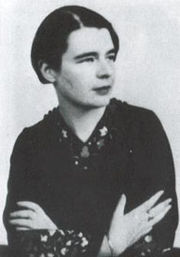Marguerite Yourcenar
| Marguerite Yourcenar | |
|---|---|
 |
|
| Born | Marguerite Antoinette Jeanne Marie Ghislaine Cleenewerck de Crayencour 8 June 1903 Brussels, Belgium |
| Died | 17 December 1987 (aged 84) Mount Desert Island, Maine, USA |
| Occupation | Author, essayist, poet |
| Nationality | French |
| Citizenship | United States |
| Notable work(s) | Mémoires d'Hadrien |
| Notable award(s) | Erasmus Prize (1983) |
| Partner(s) | Grace Frick (1903-1979) |
Marguerite Yourcenar (8 June 1903 – 17 December 1987) was a Belgian-born French novelist. She was the first woman elected to the Académie française, in 1980, and the seventeenth to occupy Seat 3.
Biography
Yourcenar was born Marguerite Antoinette Jeanne Marie Ghislaine Cleenewerck de Crayencour in Brussels, Belgium to Michel Cleenewerck de Crayencour, of French aristocratic descent, and a Belgian mother, Jeanne de Cartier de Marchienne, who died ten days after her birth. She grew up in the home of her paternal grandmother.
Yourcenar's first novel, Alexis, was published in 1929. Her intimate companion at the time, a translator named Grace Frick, invited her to the United States, where she lectured in comparative literature in New York City and Sarah Lawrence College. Yourcenar was bisexual and she and Frick became lovers in 1937, and would remain so until Frick's death in 1979.[1][2]
Marguerite Yourcenar translated Virginia Woolf's The Waves over a 10-month period in 1937.
In 1951 she published, in France, the novel Mémoires d'Hadrien, which she had been writing with pauses for a decade. The novel was an immediate success and met with great critical acclaim.
In this novel Yourcenar recreated the life and death of one of the great rulers of the ancient world, the Roman Emperor Hadrian, who writes a long letter to Marcus Aurelius, his successor and adoptive son. The Emperor meditates on his past, describing both his triumphs and his failures, his love for Antinous, and his philosophy. This novel has become a modern classic, a standard against which fictional recreations of Antiquity are measured.
Yourcenar was elected as the first female member of the Académie française, in 1980. One of the respected writers in French language, she published many novels, essays, and poems, as well as three volumes of memoirs.
Yourcenar lived much of her life at Petite Plaisance in Northeast Harbor on Mount Desert Island, Maine. Petite Plaisance is now a museum dedicated to her memory.
- Her fight for animal rights was a very important element of her life : «Les animaux sont mes amis et je ne mange pas mes amis.» ( Animals are my friends and I do not eat my friends ). She also considered that " The fight for the protection of the Animal is the same than the fight for the protection of the Man " : «La protection de l'animal, c'est au fond le même combat que la protection de l'homme.» She has been a great inspiration to many intellectuals, artists, animal right activists such as Brigitte Bardot, Frédéric Back, ...
«Soyons subversifs. Révoltons-nous contre l'ignorance, l'indifférence, la cruauté, qui d'ailleurs ne s'exercent si souvent contre l'homme que parce qu'elles se sont fait la main sur les bêtes. Rappelons-nous, s'il faut toujours tout ramener à nous-mêmes, qu'il y aurait moins d'enfants martyrs s'il y avait moins d'animaux torturés, moins de wagons plombés amenant à la mort les victimes de quelconques dictatures, si nous n'avions pris l'habitude des fourgons où les bêtes agonisent sans nourriture et sans eau en attendant l'abattoir.»
Bibliography
|
Other works available in English translation
- A Blue Tale and Other Stories, ISBN 0-226-96530-9. Three stories written between 1927 and 1930, translated and published 1995.
- With Open Eyes: Conversations With Matthieu Galey
References
- ↑ Joan Acocella (14 February 2005). "Becoming the Emperor". The New Yorker. http://www.newyorker.com/archive/2005/02/14/050214crbo_books?currentPage=6. Retrieved 2009-01-08.
- ↑ "Marguerite Yourcenar". 2002-02-21. http://andrejkoymasky.com/liv/fam/bioy1/yource01.html. Retrieved 2009-10-15-05.
- George Rousseau: Marguerite Yourcenar: A Biography. London: Haus Publishing (2004). ISBN 1-904341-28-4
- Judith Holland Sarnecki: Subversive Subjects: Reading Marguerite Yourcenar (2004)
- Josyane Savigneau: Marguerite Yourcenar: Inventing a Life, 1993
- Marguerite Yourcenar on Books and Writers, kirjasto.sci.fi.
- Jacob Stockinger (3 March 2004). "Yourcenar, Marguerite (1903-1987)". glbtq Encyclopedia. http://www.glbtq.com/literature/yourcenar_m.html. Retrieved 2009-01-08.
- English translations of Marguerite Yourcenar by Walter Jacob Kaiser Catalogue of correspondence and manuscripts concerning Walter Kaiser's English translation of works by French writer Marguerite Yourcenar located at Houghton Library, Harvard University
|
|||||